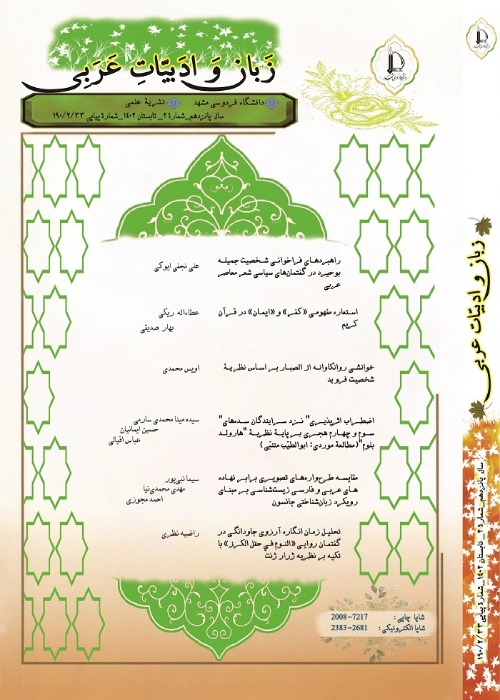The Transtexual Relationship of the Poems of Hafez Shirazi and Abu Al-Fath Bosti to the Holy Quran
Author(s):
Article Type:
Research/Original Article (دارای رتبه معتبر)
Abstract:
IntroductionShamseddin Mohammad Shirazi known as Hafez is one of the famous poets of Iran and the world, and a well-known figure in the Persian poetry. Hafez's sonnets have romantic aspects, like Saadi's sonnets, as well as some mystical aspects, like the sonnets of Attar, Maulana, and Iraqi. Wisdom and ethics in Hafez's poetry have a special place. Although the main source of Hafiz's psyche is mysticism, in these poems, moral recommendations have a special effect. In addition to illustrating the role of deep and original mystical concepts, he portrays the effects of social ethics and ethical imperatives, in which morality has come to the service of mysticism in order to reinforce human relationships, and provide a suitable platform for the plentiful journey of earthly humans. The main reason for Hafez's attention to these poetic themes is that he is a Muslim poet and believer, and his life has grown specifically with the Quran. He is a faithful believer who, with a particular mindset, sets aside the superficial layers of things and uses deep Quranic concepts and teachings.
Abu Al-Fattah Ali bin Mohammad-bin-Husaynbn-Yousef-bin-Mohammad-bin-e Abdul Aziz Al-Bosti is also one of the scholars and poets of Zhulassinin, the beginning of the Ghaznavid era, and the late 4th century AH. He was born in Bost, a city in Afghanistan, in 330 AH. After receiving basic education in literature and hadith, he was engaged in teaching in that city. He wrote poetry in both Arabic and Farsi and is the owner of a poetry book. Bosti is a well-known scholar adorned with ethical attributes such as contentment, freedom, and temperament. In his poems, he expresses moral and didactic meanings. The main reason for the plurality of these poetic themes in Bosti poetry is that he was a member of scholars, jurists, and hadith experts, and was familiar with Islamic concepts, especially the Quran, and used this knowledge to advance his poetry. Therefore, the ethical and didactic poems of the two poets, albeit formally different in appearance, share the same fundaments, which is the result of the common thoughts of both poets as a source of belief.
Theoretical FrameworkIn this research, the intertextual and transtextual relationship between Hafez and Bosti are discussed, based on the theory of the Gerard Genet.
MethodThe method applied in this study is content analysis.
Results and DiscussionThe main purpose of this article is to discover the common didactic and ethical aspects of Bosti and Hafez poetry and to show the various types of theoretical relations of these poems with the Holy Quran. The results show that the poems of Hafez Shirazi and Abu Al-Fathh are good examples of the texts born and specialized in the background of ancient Islamic literature, with a variety of dimensions in which various types of didactic and ethical concepts are derived from Quranic commands.
Conclusions and SuggestionsFrom the sum of what was said about the common didactic and ethical axes of Bosti and Hafez poetry, and the various types of relations of these poems with the Holy Quran, the results showed that both poets shared the same stance in the issues such as retribution, invitation to trust God, avoiding attachment to happiness, the instability of the world, the avoidance of superficiality and judgment, the avoidance of socializing with human beings, the invitation to thank the blessings of God, the commitment to patience and tolerance, etc.
In addition, the most important text which make the poems of Hafez and Bosti related directly or indirectly is the Holy Quran. In these poems, a variety of Quranic discourses have been re-envisioned, indicating their polyvocality, which also affirms the transtextual affairs. This connection is aimed at creating a semantic system of these poems, including interpersonal relations and genericity in the theory of Gartner's Gramont.
Based on the intertextual relationship, we find that Hafez and Bosti, due to deep acquaintance with the Islamic teachings and the Quran, adorned some of their expressions, phrases, and arguments by presenting the verses of this holy book. The interconnected nature of the texts in this section of Hafez and Bosti poems is based on the Quranic verses. The presence of these Quranic words, in addition to reflecting the content of poetry, showed the structure of the poet's beliefs.
Based on the transtextual relationship, which is based on the interpretive relations of the texts, the transtextual relationship between the didactic and ethical poems of Hafez and Bosti was confirmed. The presence of concepts related to the practical commandments of the Quran in Hafez and Bosti's poems, in addition to reflecting the supremacy of the confirmation of foundation and origin of the Quran, shows the commitment of both poets to the Islamic beliefs and reveals this fact that The Holy Quran is a hypertext. The full understanding of a significant part of the didactic poems of Hafez and Abu Al-Fath is dependant on understanding the references to the Quran verses.
Abu Al-Fattah Ali bin Mohammad-bin-Husaynbn-Yousef-bin-Mohammad-bin-e Abdul Aziz Al-Bosti is also one of the scholars and poets of Zhulassinin, the beginning of the Ghaznavid era, and the late 4th century AH. He was born in Bost, a city in Afghanistan, in 330 AH. After receiving basic education in literature and hadith, he was engaged in teaching in that city. He wrote poetry in both Arabic and Farsi and is the owner of a poetry book. Bosti is a well-known scholar adorned with ethical attributes such as contentment, freedom, and temperament. In his poems, he expresses moral and didactic meanings. The main reason for the plurality of these poetic themes in Bosti poetry is that he was a member of scholars, jurists, and hadith experts, and was familiar with Islamic concepts, especially the Quran, and used this knowledge to advance his poetry. Therefore, the ethical and didactic poems of the two poets, albeit formally different in appearance, share the same fundaments, which is the result of the common thoughts of both poets as a source of belief.
Theoretical FrameworkIn this research, the intertextual and transtextual relationship between Hafez and Bosti are discussed, based on the theory of the Gerard Genet.
MethodThe method applied in this study is content analysis.
Results and DiscussionThe main purpose of this article is to discover the common didactic and ethical aspects of Bosti and Hafez poetry and to show the various types of theoretical relations of these poems with the Holy Quran. The results show that the poems of Hafez Shirazi and Abu Al-Fathh are good examples of the texts born and specialized in the background of ancient Islamic literature, with a variety of dimensions in which various types of didactic and ethical concepts are derived from Quranic commands.
Conclusions and SuggestionsFrom the sum of what was said about the common didactic and ethical axes of Bosti and Hafez poetry, and the various types of relations of these poems with the Holy Quran, the results showed that both poets shared the same stance in the issues such as retribution, invitation to trust God, avoiding attachment to happiness, the instability of the world, the avoidance of superficiality and judgment, the avoidance of socializing with human beings, the invitation to thank the blessings of God, the commitment to patience and tolerance, etc.
In addition, the most important text which make the poems of Hafez and Bosti related directly or indirectly is the Holy Quran. In these poems, a variety of Quranic discourses have been re-envisioned, indicating their polyvocality, which also affirms the transtextual affairs. This connection is aimed at creating a semantic system of these poems, including interpersonal relations and genericity in the theory of Gartner's Gramont.
Based on the intertextual relationship, we find that Hafez and Bosti, due to deep acquaintance with the Islamic teachings and the Quran, adorned some of their expressions, phrases, and arguments by presenting the verses of this holy book. The interconnected nature of the texts in this section of Hafez and Bosti poems is based on the Quranic verses. The presence of these Quranic words, in addition to reflecting the content of poetry, showed the structure of the poet's beliefs.
Based on the transtextual relationship, which is based on the interpretive relations of the texts, the transtextual relationship between the didactic and ethical poems of Hafez and Bosti was confirmed. The presence of concepts related to the practical commandments of the Quran in Hafez and Bosti's poems, in addition to reflecting the supremacy of the confirmation of foundation and origin of the Quran, shows the commitment of both poets to the Islamic beliefs and reveals this fact that The Holy Quran is a hypertext. The full understanding of a significant part of the didactic poems of Hafez and Abu Al-Fath is dependant on understanding the references to the Quran verses.
Keywords:
Language:
Persian
Published:
Journal of Arabic Language & Literature, Volume:9 Issue: 1, 2017
Pages:
203 to 224
magiran.com/p1792996
دانلود و مطالعه متن این مقاله با یکی از روشهای زیر امکان پذیر است:
اشتراک شخصی
با عضویت و پرداخت آنلاین حق اشتراک یکساله به مبلغ 1,390,000ريال میتوانید 70 عنوان مطلب دانلود کنید!
اشتراک سازمانی
به کتابخانه دانشگاه یا محل کار خود پیشنهاد کنید تا اشتراک سازمانی این پایگاه را برای دسترسی نامحدود همه کاربران به متن مطالب تهیه نمایند!
توجه!
- حق عضویت دریافتی صرف حمایت از نشریات عضو و نگهداری، تکمیل و توسعه مگیران میشود.
- پرداخت حق اشتراک و دانلود مقالات اجازه بازنشر آن در سایر رسانههای چاپی و دیجیتال را به کاربر نمیدهد.
دسترسی سراسری کاربران دانشگاه پیام نور!
اعضای هیئت علمی و دانشجویان دانشگاه پیام نور در سراسر کشور، در صورت ثبت نام با ایمیل دانشگاهی، تا پایان فروردین ماه 1403 به مقالات سایت دسترسی خواهند داشت!
In order to view content subscription is required
Personal subscription
Subscribe magiran.com for 70 € euros via PayPal and download 70 articles during a year.
Organization subscription
Please contact us to subscribe your university or library for unlimited access!



